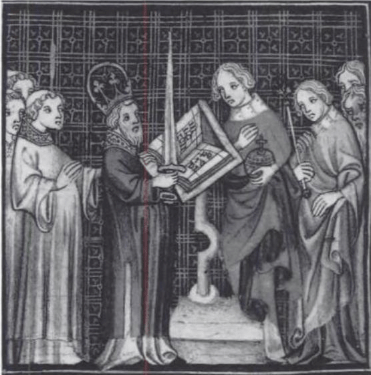From Canticum Salomonis
During the Age of Faith, a number of churches in France and Germany kept the feast of the Most Serene and August Emperor Charles on 28 January, but his cultus always enjoyed its greatest popularity in his beloved city of Aachen. The city has long reciprocated Charlemagne’s unaccountable love for their fœtid hot water springs, and, with the approbation of the Holy See, has for centuries sung this admirable sequence at Mass in honour of its Cæsarian patron.
 |
| The students of the University of Paris toast their patron St Charlemagne on his feast day. |
| Urbs Aquensis, urbs regalis, regni sedes principalis, prima regum curia. Regi regum pange laudes, quae de magni regis gaudes Karoli præsentia. |
City of Aachen! Royal city! Foremost seat of the foremost kingdom! Chief court of kings! Sing praises to the king of kings, thou who rejoicest in the presence of the great king Charles. |
| Iste cœtus psallat laetus, psallat chorus hic sonorus vocali concordia. At dum manus operatur bonum, quod cor meditatur, dulcis est psalmodia. |
Let this glad assembly sing! Let this melodious quire sing with harmonious voices! But when the hand effects the good that the heart doth meditate, sweet is the psalmody! |
| Hac in die, die festa, magni regis magna gesta recolat Ecclesia. Reges terrae, et omnes populi, omnes simul plaudant et singuli celebri lætitia. |
On this day, this festive day, the great deeds of a great king let the Church recall. Let the kings of the earth and all the people, each and all applaud with a joyful celebration. |
| Hic est Christi miles fortis, hic invictae dux cohortis, ducum sternit milia. Terram purgat lolio, atque metit gladio ex messe zizania. |
He is the mighty knight of Christ, he the commander of an army unvanquished: he casteth down a thousand chieftains. He weedeth the earth of its tares, and with his sword cutteth away the cockle from the harvest. |
| Hic est magnus imperator, boni fructus bonus sator et prudens agricola. Infideles hic convertit, fana,[1] deos hic evertit et confringit idola. |
He is the great emperor, the good sower of good fruit, and a wise husbandman. He converteth the heathen, he overturneth their temples and gods, and shattereth their idols. |
| Hic superbos domat reges, hic regnare sacras leges facit cum justitia, quam tuetur eo fine, ut et justus sed nec sine sit misericordia. |
He subdueth haughty kings, he upholdeth hallowed laws with justice, which he protecteth in order that he mayest be just, but not without mercy. |
| Oleo laetitiae unctus dono gratiae ceteris prae regibus. Cum corona gloriae, majestatis regiae insignitur fascibus. |
With the oil of gladness he is anointed, and with the gift of grace, afore all other kings. With the crown of glory he is bedecked, and with the fasces of kingly majesty. |
| O rex, mundi triumphator, Jesu Christi conregnator, sis pro nobis exorator, sancte pater Karole, emundati a peccatis, ut in regno claritatis, nos, plebs tua, cum beatis cæli simus incolæ. |
O king! Conqueror of the world! Who reignest together with Jesus Christ! Be for us a suppliant, O holy father Charles! That cleansed from our sins, in the heavenly kingdom, we, thy people, might with the blessed be dwellers of heaven. |
| Stella maris, o Maria, mundi salus, vitae via, vacillantum rege gressus et ad regem des accessus in perenni gloria. |
Star of the sea! O Mary! Salvation of the world! Way of life! Guide our faltering steps and grant us audience with the king in glory everlasting. |
| Christe, splendor Dei Patris, incorruptae fili matris, per hunc sanctum, cujus festa celebramus, nobis praesta sempiterna gaudia. Amen. |
Christ, splendour of God the Father, Son of an inviolate mother, by this saint, whose feast we celebrate, vouchsafe to us eternal joy. Amen. |

[1] Phanos in MS. G13
No comments:
Post a Comment
Comments are subject to deletion if they are not germane. I have no problem with a bit of colourful language, but blasphemy or depraved profanity will not be allowed. Attacks on the Catholic Faith will not be tolerated. Comments will be deleted that are republican (Yanks! Note the lower case 'r'!), attacks on the legitimacy of Pope Leo XIV as the Vicar of Christ, the legitimacy of the House of Windsor or of the claims of the Elder Line of the House of France, or attacks on the legitimacy of any of the currently ruling Houses of Europe.